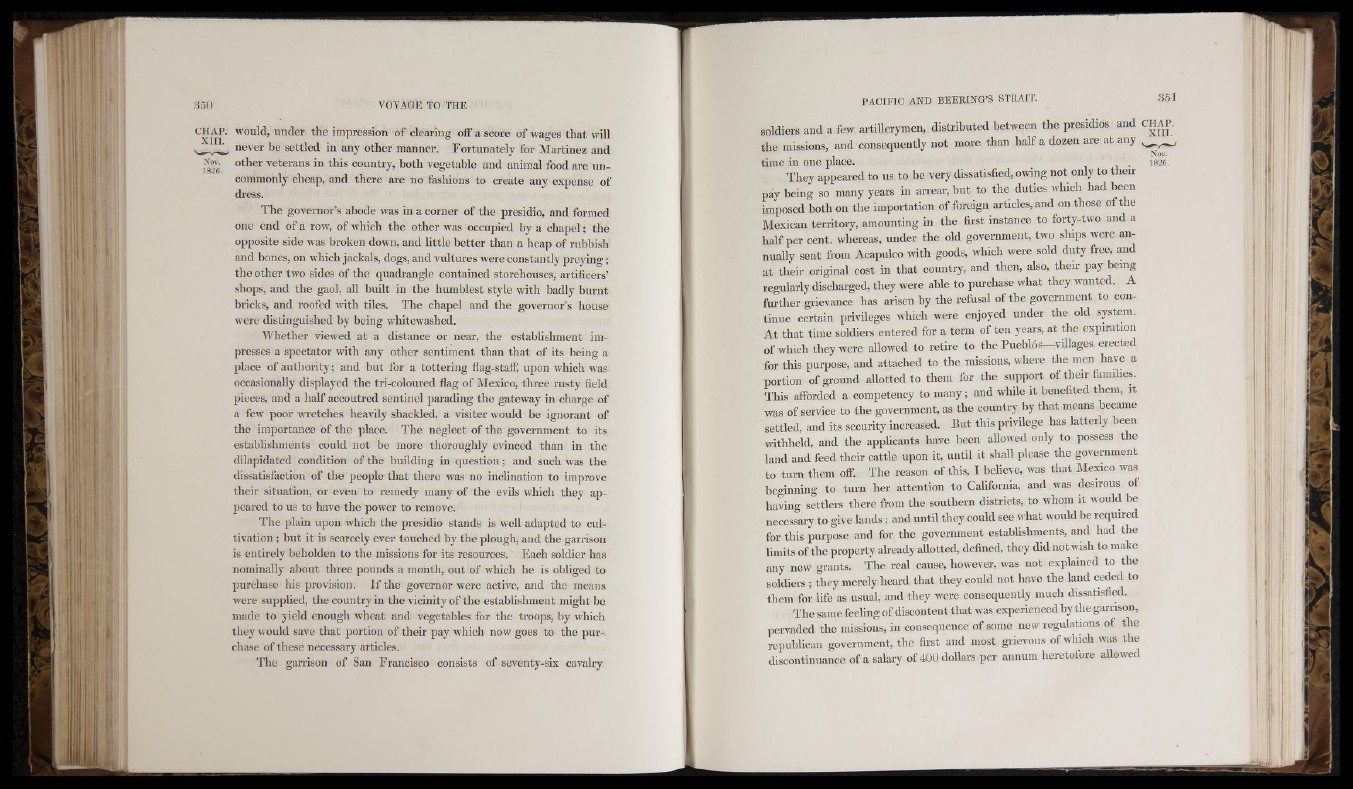
'i -
' s, 1
rin' •
i ;
CHAP. would, under the impression of clearing off a score of wages that will
Nov.
182G.
■, never be settled in any other manner. Fortunately for Martinez and
other veterans in this country, both vegetable and animal food are uncommonly
cheap, and there are no fashions to create any expense of
dress.
The governor’s abode was in a corner of the presidio, and formed
one end of a row, of which the other was occupied by a chapel; the
opposite side was broken down, and httle better than a heap of rubbish
and bones, on which jackals, dogs, and vultures were constantly preying;
the other two sides of the quadrangle contained storehouses, artificers’
shops, and the gaol, all built in the humblest style with badly burnt
bricks, and roofed with tiles. The chapel and the governor’s house
were distinguished by being whitewashed.
AA'hether viewed at a distance or near, the establishment impresses
a spectator with any other sentiment than that of its being a
place of authority; and but for a tottering flag-staff, upon which was
occasionally displayed the tri-coloured flag of Mexico, three rusty field
pieces, and a half accoutred sentinel parading the gateway in charge of
a few poor wretches heavily shackled, a visiter would be ignorant of
the importance of the place. The neglect of the government to its
establishments could not be more thoroughly evinced than in the
dilapidated condition of the building in question ; and such was the
dissatisfaction of the people that there was no inclination to improve
their situation, or even to remedy many of the evils which they appeared
to us to have the power to remove.
The plain upon which the presidio stands is well adapted to cultivation
; but it is scarcely ever touched by the plough, and the garrison
is entirely beholden to the missions for its resources. Each soldier has
nominally about three pounds a month, out of which he is obliged to
purchase his provision. I f the governor were active, and the means
were supplied, the country in the vicinity of the establishment might be
made to yield enough wheat and vegetables for the troops, by which
they would save that portion of their pay which now goes to the purchase
of these necessary articles.
The garrison of San Francisco consists of seventy-six cavalry
soldiers and a few artillerymen, distributed between the presidios and CHAP.
the missions, and consequently not more than half a dozen are at any
Nov.
time in one place. , i, •
1826.
They appeared to us to be very dissatisfied, owing not only to their
pay being so many years in arrear, but to the duties which had been
imposed both on the importation of foreign articles, and on those of the
Mexican territory, amounting in the first instance to forty-two and a
half per cent, whereas, under the old government, two ships were annually
sent from Acapulco with goods, which were sold duty free, and
at their original cost in that country, and then, also, their pay being
regularly discharged, they were able to purchase what they wanted. A
further grievance has arisen by the refusal of the government to continue
certain privileges which were enjoyed under the old system.
At that time soldiers entered for a term of ten years, at the expiration
of which they were allowed to retire to the Pueblds—villages erected
for this purpose, and attached to the missions, where the men have a
portion of ground allotted to them for the support of their families.
This afforded a competency to many; and while it benefited them, it
was of service to the government, as the country by that means became
settled, and its security increased. But this privilege has latterly been
withheld, and the applicants have been allowed only to possess the
land and feed their cattle upon it, until it shall please the government
to turn them off. The reason of this, I believe, was that Mexico was
beginning to turn her attention to California, and was desirous of
having settlers there from the southern districts, to whom it would be
necessary to give lands; and until they could see what would be required
for this purpose and for the government establishments, and had the
limits of the property already allotted, defined, they did not wish to make
any new grants. The real cause, however, was not explained to the
soldiers; they merely heard that they could not have the land ceded to
them for life as usual, and they were consequently much dissatisfied.
The same feeling of discontent that was experienced by the garrison,
pervaded the missions, in consequence of some new regulations of the
republican government, the first and most grievous of which was the
discontinuance of a salary of 400 dollars per annum heretofore aUowed